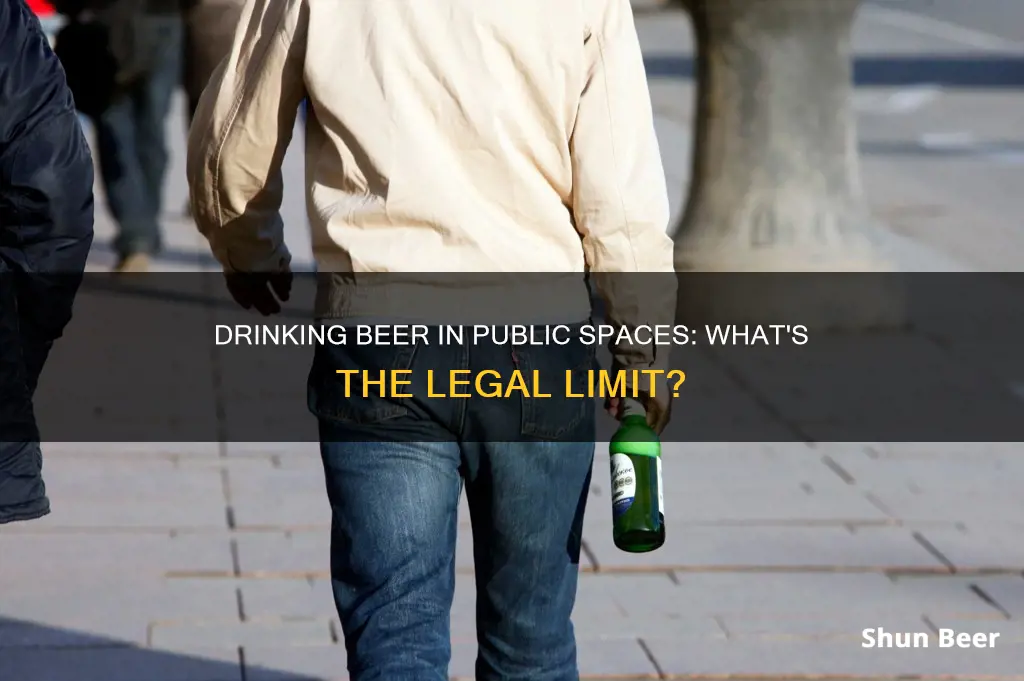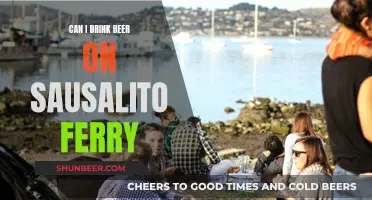
Drinking in public is a contentious issue that divides opinion across the world. While some countries, such as Norway, Poland, India, Sri Lanka, and certain U.S. states, condemn or outlaw it, others like Denmark, Portugal, Spain, Germany, and the U.K. find it socially acceptable. The laws and social norms surrounding public drinking vary significantly from country to country and even within different areas of the same country. For instance, in the U.S., each state and sometimes each city or county has its own open container laws, leading to a complex patchwork of regulations.
What You'll Learn

Where in the world is it legal to drink in public?
Drinking alcohol in public is legal in many parts of the world, although specific laws and social norms vary from place to place. Here is a list of some countries and regions where drinking in public is permitted:
United States
The laws regarding public drinking in the United States vary at the state and local levels. Some states, such as Georgia, Louisiana, Missouri, Montana, Nevada, and Pennsylvania, allow open containers in public. Cities like New Orleans, Las Vegas, and Savannah are well-known for their permissive drinking culture. Additionally, certain towns and cities have designated entertainment districts or outdoor refreshment areas where public drinking is allowed, such as Beale Street in Memphis, Tennessee, and Sonoma Plaza in Sonoma, California.
Canada
In Canada, the laws regarding public drinking differ across provinces and territories. In Quebec, the laws are more relaxed, especially in cities like Montreal where drinking in public parks is generally accepted as long as it is accompanied by food. Alberta has also amended its laws to allow the consumption of alcohol in designated locations within public parks. However, in most other parts of Canada, including Ontario and British Columbia, possession of open containers in public is generally prohibited.
Europe
In Europe, the legality and social acceptance of public drinking vary by country. For example, in the United Kingdom, public drinking is legal in England and Wales, but the sale of alcohol is restricted in Scotland and Northern Ireland. In Austria, public drinking is allowed for those of legal drinking age, which varies depending on the type of beverage. Similarly, in Germany, Denmark, Finland, and Switzerland, public drinking is generally allowed, but there may be local restrictions in certain areas.
Asia
In Asia, the legality of public drinking differs significantly across countries. For instance, in China, Japan, and Singapore, public drinking is legal and socially accepted to varying degrees. On the other hand, countries like India, Malaysia, and Muslim-majority countries in the region often have stricter laws and social norms that discourage or prohibit public drinking.
Australia and New Zealand
In Australia, public drinking laws vary, with some Indigenous Australian communities prohibiting alcohol due to alcohol-fuelled violence. In New Zealand, public drinking is generally allowed, but local authorities can declare liquor-free zones where consumption is restricted to licensed premises and private property.
Other Countries
Colombia, Brazil, and Chile in South America have unique approaches to public drinking. Colombia previously banned it but later reverted this decision to promote a "free healthy culture". Brazil allows public drinking, but driving under the influence is strictly enforced. Chile generally prohibits public drinking, except during New Year's Eve celebrations.
Pilsner Glasses: Best Beers to Enjoy in This Glassware
You may want to see also

What are open container laws?
Open container laws regulate or prohibit drinking alcohol in public spaces. These laws aim to restrict public intoxication and the operation of vehicles while intoxicated. In the context of these laws, “public places” refer to openly public spaces such as sidewalks, parks, and vehicles, but do not include nominally private spaces that are open to the public, such as bars and restaurants.
Open container laws prohibit the presence of any unsealed container carrying an alcoholic beverage. This means that some contents have been removed, the seal is broken, or the cap is off. These laws apply to all types of containers that can hold alcoholic beverages, including cans, bottles, flasks, and other vessels.
In the United States, open container laws are state laws and vary across different states. While the majority of states and localities prohibit possessing or consuming an open container of alcohol in public places, there are exceptions. For example, 24 states do not have statutes regarding the public consumption of alcohol, and some states allow open containers in certain entertainment districts or during specific events. Additionally, open container laws may not apply to passengers of vehicles used for transportation for pay, such as taxis, or the living quarters of recreational vehicles.
Penalties for violating open container laws differ across states but can include fines, jail time, license demerit points, and community service.
Beer and Azithromycin: What You Should Know
You may want to see also

Is drinking in public parks legal?
The legality of drinking in public parks varies from country to country and even from city to city.
In some countries, such as Norway, Poland, India, Sri Lanka, and Muslim-majority countries where alcohol is legal, public drinking is almost universally condemned or outlawed. In contrast, countries like Denmark, Portugal, Spain, Germany, the United Kingdom, New Zealand, Japan, Finland, and China accept public drinking as a social norm.
In the United States, open container laws and restrictions on drinking in public parks vary from state to state. Some states, such as Arizona, Arkansas, Hawaii, Kansas, Maryland, Minnesota, New Mexico, Oklahoma, South Carolina, Utah, Virginia, Washington, and West Virginia, enforce statewide bans on public alcohol consumption, with no exceptions for parks. On the other hand, states like Colorado, Indiana, and Mississippi have more relaxed restrictions, allowing public consumption of alcohol with certain limitations.
In Europe, countries like the United Kingdom, Denmark, and Finland generally have more relaxed open-container laws, although specific regulations may vary by city. For example, in the UK, drinking in public parks is allowed, but drinking in certain designated alcohol-free zones is prohibited.
It's important to note that even within countries or states that allow public drinking, there may be specific restrictions on drinking in certain public parks or areas within parks. Additionally, some locations may require special permits or only allow drinking during certain times or events. Therefore, it's always advisable to check the local laws and regulations before consuming alcohol in a public park.
While proponents of drinking in public parks argue that it promotes a healthier drinking culture and does not inherently cause issues, opponents raise concerns about overconsumption, rowdiness, violence, and the negative environmental impact of alcoholic beverage containers.
Orthodox Christians: Beer During Fasting, Allowed or Not?
You may want to see also

What are the penalties for drinking in public?
The penalties for drinking in public vary depending on the country and even the region. Here is a list of penalties for drinking in public for different places around the world:
United States
Drinking in public places, including sidewalks, parks, stadiums, and beaches, is considered illegal in most jurisdictions in the US. Penalties range from hundreds of dollars in fines to jail time in some locales. However, there are some states and cities that allow drinking in public, such as New Orleans, Las Vegas, and Fredericksburg, Texas.
Canada
In Canada, except for Quebec, possession of open containers of alcohol in public is generally a violation of provincial acts and municipal bylaws. The penalty for possession of an open container or consumption of liquor in a public place is a fine.
United Kingdom
In the UK, drinking in public is generally legal, but there are some places where it is prohibited, such as the London Underground and the majority of Belfast. The penalties for drinking in public can include fines of up to £500.
Australia
In Australia, public drunkenness is no longer a criminal offence in Victoria as of November 7, 2023. However, there are still penalties for other alcohol-related offences, such as drinking and driving, which can result in fines, imprisonment, and loss of licence.
European Countries
In European countries, the penalties for drinking in public vary. For example, in Belgium, public drinking is legal, but some cities like Antwerp and Brussels have local ordinances that make it illegal in certain areas. These laws can result in fines of up to €350. In France, public intoxication is illegal and can result in a fine of up to €150. In contrast, countries like Denmark, Portugal, and Germany generally accept public drinking.
Asian Countries
In Asia, the penalties for drinking in public also differ from country to country. For instance, in Singapore, drinking in public is restricted from 10:30 PM to 7:00 AM. On the other hand, countries like Japan, China, and Laos have no laws forbidding public drinking.
Latin American Countries
Latin American countries also have varying penalties for drinking in public. For example, in Brazil, drinking in public is legal and socially accepted, but DUI laws are enforced, and offenders may lose their license. In contrast, Chile has one of the highest alcohol consumption rates in the Americas, and public drinking is generally prohibited, except on New Year's Eve.
Beer After Dinner: A Healthy Choice?
You may want to see also

How do public drinking laws affect tourism?
Public drinking laws vary significantly around the world. In some countries, such as Norway, India, Poland, and Sri Lanka, public drinking is almost universally condemned or outlawed. In contrast, other countries, such as Denmark, Portugal, Spain, Germany, the United Kingdom, New Zealand, Japan, Finland, and China, have socially accepted public drinking cultures.
The impact of public drinking laws on tourism is complex and multifaceted. On the one hand, lenient public drinking laws can attract tourists who enjoy the freedom to consume alcohol in outdoor spaces. For example, cities like New Orleans, Las Vegas, and Indianapolis in the United States are known for their permissive public drinking laws, which have contributed to their reputation as popular tourist destinations. In these cases, lenient public drinking laws can boost tourism and encourage visitors to support local businesses, bars, restaurants, and hotels.
On the other hand, strict public drinking laws can also impact tourism negatively. Tourists who enjoy consuming alcohol in public may choose to avoid destinations with strict laws prohibiting this activity. Additionally, the enforcement of public drinking laws can lead to negative experiences for tourists who unintentionally violate these laws, resulting in fines or even jail time in some cases.
The impact of public drinking laws on tourism may also depend on the specific regulations and their implementation. For instance, while a country may have strict laws prohibiting public drinking in certain areas, it may allow designated entertainment districts or outdoor refreshment areas where public consumption of alcohol is permitted. This balance between restriction and designated drinking areas can help promote tourism while also addressing concerns related to public intoxication, rowdiness, and littering associated with unrestricted public drinking.
Furthermore, cultural and religious factors play a significant role in shaping public drinking laws and their impact on tourism. Muslim-majority countries, for example, often have strict laws against public drinking, even if alcohol is legal for non-Muslims or certain minority groups. Tourists visiting these countries need to be aware of and respectful towards these cultural and religious sensitivities.
In conclusion, public drinking laws can significantly influence tourism patterns. While lenient laws can attract tourists seeking freedom and enjoyment, strict laws may deter visitors who enjoy consuming alcohol in outdoor spaces. The impact of these laws is also shaped by cultural contexts, enforcement practices, and the availability of designated drinking areas. Ultimately, the relationship between public drinking laws and tourism is complex and varies across different regions and countries.
Brewery Workers: Beer Drinking on the Job?
You may want to see also
Frequently asked questions
It depends on the state and local laws. While some states have banned drinking in public spaces statewide, other states don't have a specific law, but most cities or counties do prohibit it.
Yes, there are some cities and entertainment districts that permit public drinking, such as New Orleans, Las Vegas, Indianapolis, Kansas City, Memphis, and Mobile.
Open container laws prohibit possessing and drinking alcoholic beverages in motor vehicles and public places. These laws aim to reduce drunk driving, prevent public intoxication, and curb disruptive behaviour and littering associated with public drinking.
Penalties vary by state and can range from fines to jail time. For example, in Ohio, consuming alcohol in a motor vehicle can result in a fourth-degree misdemeanour, with possible jail time of up to 30 days and/or a $250 fine.
It depends on the location. While some states and cities ban drinking in public parks, others allow it in designated areas or under certain conditions, such as requiring drinks to be in plastic cups or limiting alcohol content.







